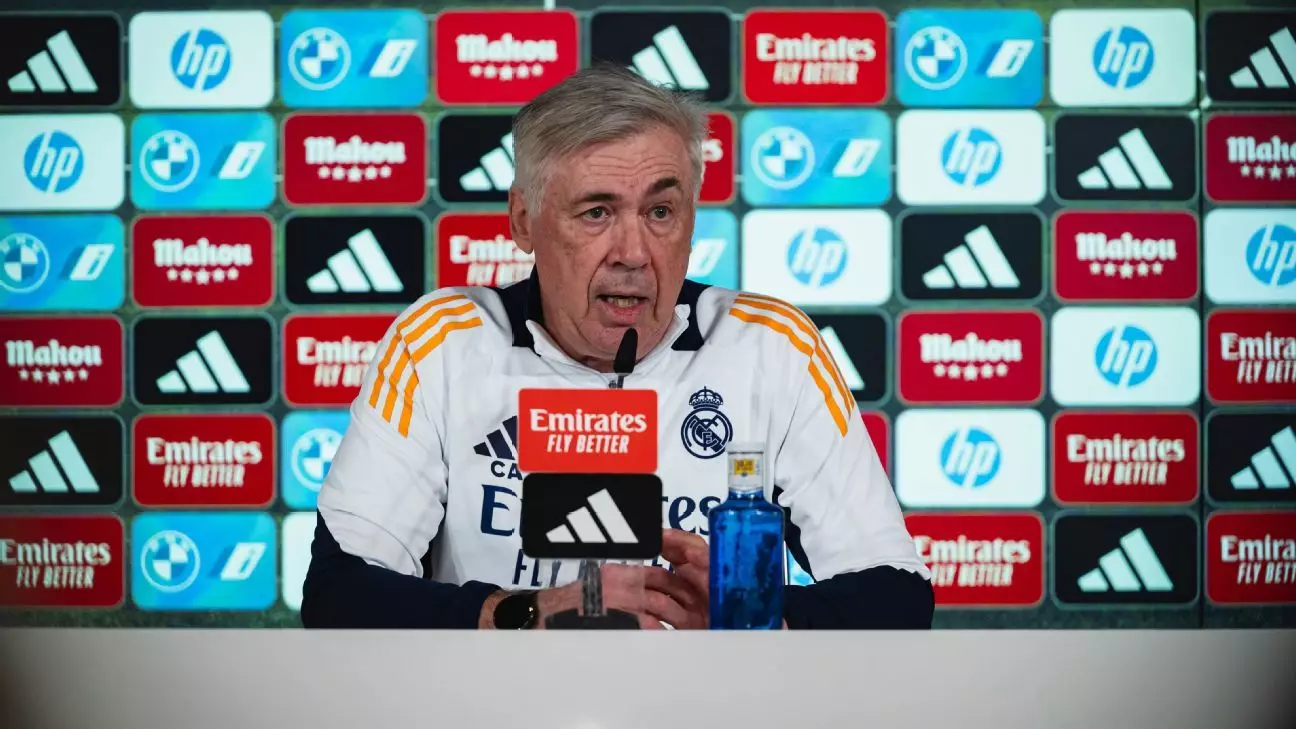In the fierce world of competitive football, few scenarios induce as much scrutiny and second-guessing as a heavy defeat against a rival. Carlo Ancelotti, Real Madrid’s esteemed manager, recently found himself in this predicament following a disheartening 5-2 defeat to Barcelona in the Spanish Supercopa final. This loss, which followed a previous humiliation by the same opponents, prompted intense analysis of his tactical decisions and the overall commitment of his squad. Yet, rather than engaging in a lively debate with critics and analysts after the match, Ancelotti opted for a measured, serene response that highlighted his lasting experience and confidence in his team.
During a press briefing ahead of an upcoming Copa del Rey encounter, Ancelotti clearly delineated the role of a press conference as a platform for communication rather than debate. He stated, “I’ve already done the debate with my technical staff and my players,” a decisive affirmation of his belief in thorough internal analysis while isolating external noise. This perspective underlines Ancelotti’s understanding of the media’s fluctuations, wherein coaches oscillate between being lauded as tactical geniuses or lambasted as uninspired leaders based on fluctuating results. His insistence on maintaining composure in the face of criticism reveals a steadfastness that galvanizes a team often reliant on psychological fortitude in high-stakes situations.
Importantly, Ancelotti urged for perspective amidst the aftermath of the loss. Real Madrid, holding a position just one point adrift of La Liga leaders Atlético Madrid, remains competitive across multiple fronts, including domestic and European tournaments. His assertion that, “It was a step back but we have to look ahead,” epitomizes the sentiment that, while defeats can sting, they do not spell doom for an ambitious club. Ancelotti adeptly acknowledged the mistakes made during the match—calling them a “ton of mistakes”—but coupled these admissions with a reminder of the team’s strengths and past successes, like their victories in the FIFA Club World Cup and the Champions League. This balanced outlook is crucial in fostering resilience within the squad, urging players to bounce back rather than dwell in despair.
Backing His Players: Trust in the Process
In moments of crisis, the treatment of players often defines a manager’s legacy. Ancelotti’s unwavering support for his players, particularly those struggling to perform at their peak, speaks volumes about his leadership style. He expressed full confidence in every member of his roster, indicating a commitment to fostering development through challenges. Among the players finding their form again is Kylian Mbappé, who scored in the Supercopa match despite the team’s overwhelming loss. Ancelotti’s observations regarding Mbappé’s adjustment to the intensity of La Liga demonstrate a broader understanding of the transitional periods players may endure.
Looking ahead to the vital match against Celta Vigo, Ancelotti’s intention to field a robust lineup signifies a strategic push towards recovery and redemption. His anticipation for a strong reaction from his players encapsulates a common narrative in elite sports: the importance of resilience after a setback. This upcoming match not only offers an immediate opportunity for rectification but also serves as a psychological test of character for the squad, an aspect Ancelotti surely recognizes.
Carlo Ancelotti exemplifies a calm and contemplative leadership style that seeks to learn from defeats while maintaining a steadfast belief in his players. His approach underscores the significance of perspective, support, and anticipation for future challenges, merging tactical knowledge with an understanding of the mental demands on players. In a sport characterized by ruthlessness, Ancelotti’s balanced mindset could very well be the key to guiding Real Madrid through turbulence towards renewed success.
